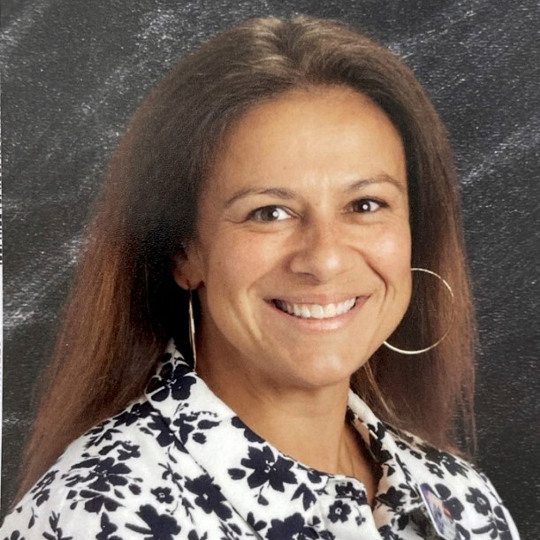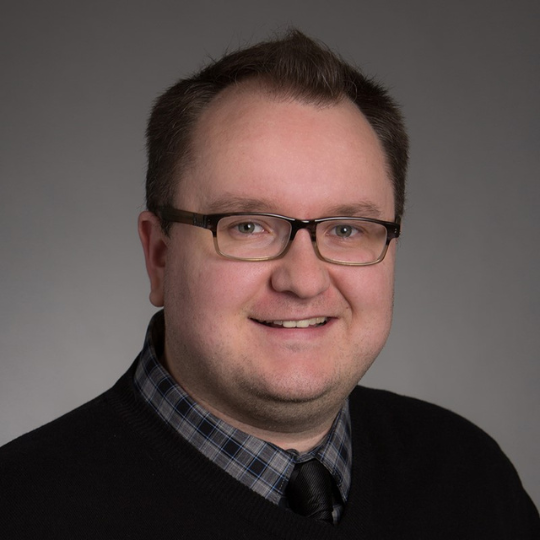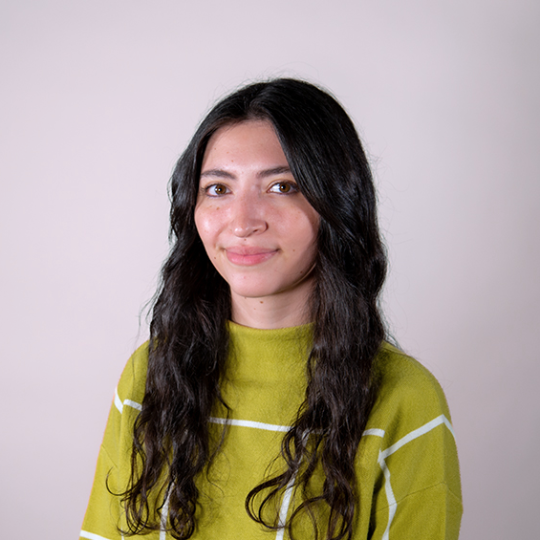April 3, 2024 | Kate Malazonia
Publications Writer, The Graduate College
Graduate Student Appreciation Week (GSAW) recognizes the contributions, impact, and value of our graduate and professional students. Every year, The Graduate College celebrates the TXST graduate student community with this week-long event. This year, Samantha Marie Serrano, Jonathan Tague, Shamin Benny, and Mariangela Rodriguez gave an insight into the unique experiences of online graduate students.
Being an online student can be a new experience for many students entering higher education. From adapting to new technology, and attending virtual events to socially interacting with classmates, and engaging with professors, it would suffice to say that it comes with its own challenges. With online programs on the rise, it has never been more imperative to maintain a welcoming and well-functioning online presence for students. The following graduate students are prime examples of what it means to be a TXST online graduate student.
Samantha Marie Serrano
Serrano is completing her Ph.D. in geographic education, is a member of the Phi Kappa Phi Honor Society, and is currently serving on the Board of Directors for the National Council for Geographic Education (NCGE). Serrano is a first-generation undergraduate and graduate student, as well as a former NCAA Division I track and field All-American. Additionally, she is a full-time Social Science teacher at James B. Conant High School in Hoffman Estates, Illinois where she has taught since 2004.

“Geography Education graduate programs are difficult to come by, let alone online”, she highlighted. Indeed, there is no other program in the United States that offers an online Ph.D. program in Geography Education, and this is precisely why Serrano chose TXST.
“For a geography department to be open-minded enough to create a program that cuts across state and country borders is incredibly cutting-edge and ahead of its time.”
Being an online student has allowed Serrano to work towards another advanced degree while holding a full-time teaching job.
“Though my coursework has been online, I find that Texas State’s mix of asynchronous and synchronous studies is incredibly challenging and has pushed me beyond my previous knowledge in unexpected ways."
Serrano has attended the annual summer academy, hosted by the Geography Education program for Ph.D. students.
“This has given us great opportunities to meet other online students face-to-face and collaborate with our peers.”
Serrano credits Injeong Jo, Ph.D., her graduate advisor, for meeting with her students regularly via Zoom and Michael Solem, Ph.D., one of her professors. Solem praised Serrano for her decision to pursue a Ph.D.
“In addition to pursuing a Ph.D. at TXST, Samantha’s leadership is evident in her role on the Board of Directors for the National Council for Geographic Education. As a full-time geography teacher, Samantha is positioned to apply her advanced knowledge and skills to benefit her students and school district.”
Jo said, “Samantha’s research will make a significant contribution to the field of geography education by providing insights into how social and cultural capital impact student learning outcomes…” referring to her investigation on cumulative impacts of Advanced Placement courses in shaping academic trajectories for early high school students.
Serrano also credits The Graduate College Shop Talks series for making her “feel part of the Texas State community.” She also credits the Texas State Library and its databases.
In the future, Serrano plans to continue teaching high school geography and contribute to national geography education efforts through her research and writing.
Jonathan Tague
Tague recently completed a master of science in dementia and aging studies (MSDA) at Texas State University.
“I had a personal goal to earn a master’s degree by the age of 40 and had been looking for a master’s program for several years, but I wasn’t quite sure exactly what my area of focus would be.”
After attending a webinar called “Dementia Around the World”, presented by Christopher Johnson, Ph.D., a faculty member in the TXST MSDA program, Jonathan had an “aha moment”. Within a few weeks, he submitted his application.

Tague started the program while living in Chicago, and later moved to San Diego.
“Being an online student allowed me to make such a move without disrupting my studies…I could have additional time and flexibility to focus on my studies while continuing to meet the demands of working full-time and managing personal responsibilities.”
The MSDA is the first-in-the-nation online gerontology program with a concentration on dementia studies.
“If this program had not been offered online, it would not have been possible for me to attend as a student without moving to the San Marcos, TX area.”
Tague highlighted how as an online student, he felt a part of the MSDA program community.
“My Texas State community was my peers and professors whom I met and interacted with in my courses. I felt there were also plenty of resources and opportunities available to meet other students, staff, and faculty outside of the MSDA too, through certain events like Graduate Student Appreciation Week.”
Tague credits his graduate advisor and professor, Kyong Hee Chee, Ph.D., for his success as an online student. “She was instrumental in making sure MSDA students felt part of the TXST community, such as starting my first semester off with a virtual MSDA orientation with fellow new and current students.”
Chee spoke of Tague’s enthusiasm saying, “Jonathan Tague was a stellar MSDA student and peer mentor who had maintained clear and high expectations for his studies, and passion for the field of dementia and aging.”
Tague has continued to be an MSDA Peer Mentor to help guide newer MSDA students, even after graduating. In addition, Tague is an Outreach & Education Specialist at Aging & Independence Services, County of San Diego.
“I educate, engage, and empower communities in San Diego County by providing outreach on aging resources and educational presentations on aging-related topics, such as dementia and brain health; elder abuse prevention and trainings for mandated reporters; fraud and scam prevention; and mental health awareness.”
Shamin Benny
Benny is completing her master of science in respiratory care with a Clinical Specialist concentration, housed at the TXST Round Rock campus. She is a dual board-certified Respiratory Therapist and currently, she is a clinical instructor for the University of Doha in the RT Dept of College of Health Science. Benny moved from the Middle East looking for more opportunities and she did not want her education to take a back seat.
“As a professional and holder of a full-time academic job, I wanted something where I could learn as I work and also, something that would help me develop in my current job.”

Benny emphasized how to her, the quality and the workload of online education is just as high as in-person and therefore, it was not difficult for her to choose an online program over an on-campus one. Additionally, being in an online program allowed Benny to organize her time and this helped her navigate through the hectic days of work and her education.
“The flexibility that online programs provide as well as the ability to access lectures and course materials at any time is one of their biggest advantages.”
On whether she feels a part of the TXST community, Benny noted, “…without a doubt, I feel a part of the TXST community. I get regular updates about what is happening in the university, I get to be in regular contact with my instructors and receive constructive feedback about my progress, and I get to be actively engaged with the resources, support services, and opportunities available to me remotely.”
Benny’s instructors have played a pivotal role in helping her navigate through this journey.
“Dr. Christopher Russian guided me step by step, gave me an idea of what my expectations were, and also encouraged me to take up this challenge.”
Christopher Russian, Ph.D. emphasized how this program aligns seamlessly with Benny’s long-term aspirations.
“Shamin, with her clinical expertise and unwavering enthusiasm for education, adeptly integrates her extensive healthcare experience into class assignments, enriching discussions with real-world insights.”
Benny’s advice to future online graduate students is clear.
“Above all, understand that online learning requires self-discipline, time management, and motivation and be realistic about the time commitment required for coursework, assignments, and studying. Establish a network of friends, family, mentors, instructors, and classmates who will be there for you when you take an online course and can offer support and direction.”
Benny aims to begin pre-candidacy for her doctoral degree during the second year of her graduate studies to develop her teaching skills.
“12 years back, when I graduated high school, all I wanted was to get a degree that would give me a decent job. Over the years, I started to aim higher and the things I believed were impossible started being possible. I want to cheer you to aim higher and never settle for less. I find great passion in teaching and being taught, and I strive to do better every day.”
Mariangela Rodriguez
Rodriguez is completing her master of fine arts in communication design. She is a Graduate Teaching Assistant in the School of Art and Design, a member of the Graduate House of Representatives, and was nominated for the 2023-2024 Outstanding Graduate Student Award. She has also been awarded the 2024 Graphic Design USA Student to Watch.
Rodriguez delved into what allowed her to begin her graduate journey.

“It was amid the pandemic in 2020 that I decided to get my master’s. I had also moved to my hometown to be closer to family and didn’t want to move far from them. Luckily, I found the Communication Design program. With the courses offered, distinguished faculty, and residency opportunities, it was a great fit.
Being an online student allowed Rodriguez to continue her professional career with a full-time job while taking classes in the evenings.
“I had the flexibility to choose where I wanted to live and how to spend my time without the requirement of being on campus.”
Rodriguez frequently keeps up with her classmates, describing the Communication Design program as its own “dynamic community”.
She emphasized how her favorite time of the semester is ‘residency’; a conference on campus that occurs at the end of the semester there are special guests, workshops, and student presentations.
“Everyone in the program, including faculty, comes together, and it’s a special and fun time.”
“All of my professors have done a fantastic job of reaching beyond the screen and enhancing our low-residency experience. I have to shout out Alice Lee, Molly Sherman, and Dimitry Tetin. I’ve worked closer with them in the past year and my experience in this program wouldn’t be the same if not for them.”
Rodriguez highlighted that the service she utilizes the most is the University Writing Center.
“I am a designer and not a trained writer…having the University Writing Center available online and through Zoom has helped me get feedback from trained writers, especially from an audience outside of my field.”
In the future, Rodriguez plans to work in a design studio that aligns with her values and practice. Additionally, she will continue pursuing teaching in the future and work on my independent publishing practice.
To explore all of the online graduate degree programs offered by TXST, please visit the Online and Extended Programs website.